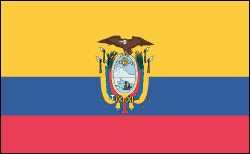Ecuador History


The Arrival of El Nino Ushers in a Period of Economic Instability
In 1998, Ecuador experienced one of its worst economic crises. El Niño caused $3 billion in damage; the price of its principal export, oil, plunged; and its inflation rate—43%—was the highest in Latin America. In 1999, the government was near bankruptcy, the currency lost 40% of its value against the dollar, and the poverty rate soared to 70%, doubling in five years. The president's economic austerity plan was protested with massive strikes in March 1999.
President Jamil Mahuad was overthrown in Jan. 2000, in the first military coup in Latin America in a decade. The junta gave power to the vice president, Gustavo Noboa. Faced with the worst economic crisis in Ecuador's history, Noboa restructured Ecuador's foreign debt, adopted the U.S. dollar as the national currency, and continued privatization of state-owned industries, generating enormous opposition. In Feb. 2001, the government cut fuel prices after violent protests by Indians, who are among Ecuador's most disadvantaged people. Within two years, Ecuador's economy had rebounded from the brink of collapse. The economy grew by 5.4% for 2001, the highest rate in Latin America. Inflation was 22%, down from 91% in 2000, and the budget was balanced. But chronic corruption among senior government officials, as well as among the courts and the judiciary, has continued.
Lucio Gutiérrez, a leftist colonel best known for orchestrating the 2000 coup against President Jamil Mahuad, was elected to the presidency in 2003 on an anticorruption platform. He became Ecuador's sixth president in seven years. His attempts to introduce austere fiscal reforms, however, quickly alienated his political base, and numerous national strikes took place throughout 2003. In April 2005, Gutiérrez was ousted by the Ecuadoran Congress, after replacing much of the supreme court with his allies. Polls at the time indicated that just 5% of the people supported him. His estranged deputy, Alfredo Palacio, took over as president. In 2006, huge nationwide protests took place concerning a potential free-trade agreement with the U.S. In the Nov. 2006 presidential runoff elections, Rafael Correa, a left-wing economist, won with 56.7% of the vote, defeating conservative businessman Alvaro Noboa. Correa took office in Jan. 2007.







